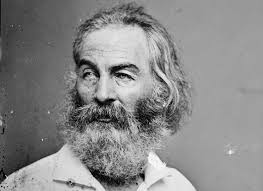Tuesday
Like many people, I’ve been reexamining what makes American democracy work and how to keep it going. The Atlantic has run many articles on the subject, and one in the October issue particularly hit home. Hillary Yoni Appelbaum worries that “in recent decades, Americans have fallen out of practice, or even failed to acquire the habit of democracy in the first place.”
Appelbaum calls for increased civic participation and describes the damage caused by sitting on the sidelines. For instance, she notes a startling fact about Donald Trump’s support during the GOP primaries:
But among those who seldom or never participated in community activities such as sports teams, book clubs, parent-teacher associations, or neighborhood associations, Trump led 50 to 24 percent. In fact, such civically disengaged voters accounted for a majority of his support.
So how does one motivate citizens to become civically engaged? In 1871 Walt Whitman said that the arts needed to step up their game.
Writing when the United States was still trying to pull itself back together after the Civil War, Whitman describes a crisis of self belief that we can relate to today:
I say we had best look our times and lands searchingly in the face, like a physician diagnosing some deep disease. Never was there, perhaps, more hollowness at heart than at present, and here in the United States. Genuine belief seems to have left us. The underlying principles of the States are not honestly believ’d in, …nor is humanity itself believ’d in.
Whitman believes that literature holds the key:
I say that democracy can never prove itself beyond cavil, until it founds and luxuriantly grows its own forms of art, poems, schools, theology, displacing all that exists, or that has been produced anywhere in the past, under opposite influences….Our fundamental want to-day in the United States, with closest, amplest reference to present conditions, and to the future, is of a class, and the clear idea of a class, of native authors, literatures, far different, far higher in grade than any yet known…
Whitman, of course, made his own literary contribution in Leaves of Grass, especially the magnificent celebration of our diversity in Song of Myself. Some argue that this is the most important American poem ever written and it certainly calls for us to acknowledge the full variety and complexity of ourselves as an immigrant nation. Literature and the arts, Whitman says, will consolidate “the nationality of these States” and allow each one to step into its potential:
The literature, songs, esthetics, &c., of a country are of importance principally because they furnish the materials and suggestions of personality for the women and men of that country, and enforce them in a thousand effective ways.* As the top-most claim of a strong consolidating of the nationality of these States, is, that only by such powerful compaction can the separate States secure that full and free swing within their spheres, which is becoming to them, each after its kind, so will individuality, with unimpeded branchings, flourish best under imperial republican forms.
Earlier in the essay he writes,
Above all previous lands, a great original literature is surely to become the justification and reliance, (in some respects the sole reliance,) of American democracy.
When I look at American literature today, I see “native authors” who, if not “higher in grade than any yet known” (how would one judge?), nevertheless make rich contributors to the American mosaic. To choose just a few at random, I think of Louise Erdrich, Toni Morrison, Richard Russo, Philip Roth, Amy Tan, Elizabeth Strout, Mary Oliver, Wendell Berry, Philip Levine, Lee Young Lee, Naomi Shihab Nye, and Natasha Tretheway as authors who help us understand better what it means to be American and what it means to be human.
Any civic reclamation project would be given a great boost by a full bath immersion in American literature.
